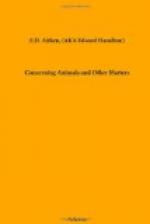It is rather remarkable that, after so many years, another Scottish doctor, not in Madras, but in Edinburgh, has proved, by just such experiments as Dr. Nicholson shrank from, that an “aged and previously sedate horse” may, by gradual inoculation with cobra poison, be rendered so thoroughly proof against it that a dose which would suffice to kill ten ordinary horses only imparts “increased vigour and liveliness” to it. Further, Dr. Fraser has found that the serum of the blood of an animal thus rendered proof against poison is itself an antidote capable of combating that poison after it has been at work for thirty minutes in the veins of a rabbit, and arresting its effects. And all this has been achieved without apparent detriment to the distinguished doctor’s sanity.
This must be intensely interesting intelligence to Englishmen throughout India, and joyful intelligence too, for, scoff as we may at the danger of being bitten by a poisonous snake, nobody likes to think that, if such a thing should happen to him (and very narrow escapes sometimes remind us that it may), there would be nothing for him to do but to lie down and die. And so, ever since the Honourable East India Company was chartered, the antidote to snake poison has been a sort of philosopher’s stone, sought after by doctors and men of science along many lines of investigation. And every now and then somebody has risen up and announced that he has found it, and has had disciples for a season.
But one remedy after another, though it might give startling results in the laboratory, has proved to be useless in common life, and the majority of Englishmen have long since resigned themselves to the conclusion that there is no practical cure for the bite of a poisonous snake. For what avails it to carry about in your travelling bag a phial of strong ammonia and to live in more jeopardy of death by asphyxiation than you ever were by snakes, unless you have some guarantee that, when it is your fate to be bitten by a snake, the phial will be at hand? For ammonia must act on the venom before the venom has had time to act upon you, or it will only add another pain to your end; and that gives only a few minutes to go upon. So with nitric acid and every agent that operates by neutralising the poison and not by counteracting its effects. And this has been the character of all the remedies hitherto put forward. “They are,” says Sir Joseph Fayrer, “absolutely without any specific effect on the condition produced by the poison.”
But “anti-venene,” as Dr. Fraser calls his immunised blood-serum, follows the poison into the system, even after the fatal symptoms have begun to show themselves, and arrests them at once. So the Anglo-Indian may throw away his ammonia phial and, arming himself with another of anti-venene and a hypodermic syringe, feel that he is safe against an accident which will never happen. As for the man who is not nervous, he will speak of the new antidote, and think of it as most interesting and valuable, and go on his way as before with no expectation of ever being bitten by a venomous snake. The medical man of every degree will order a supply as soon as it is to be had, and conscientiously try to stamp out the smouldering hope within him that somebody in the station will soon be bitten by a cobra and give him a chance.




